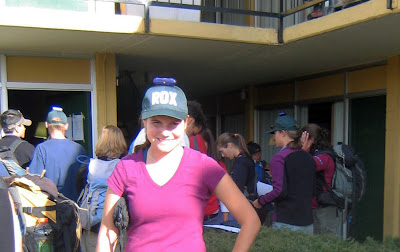In Fall of 2005 I participated in “The Stretch”, the trimester-long geology field camp run by Dartmouth College. In recent years, the field camp has taken place in the western continental US. Many years ago, the field camp also took place in Central America, Hawaii, and other locations.
The year I went on The Stretch, we studied geology in Wyoming, Montana, Utah, Nevada, California, and Arizona. We drove thousands of miles and did dozens of geology field projects, ranging from small one-day assignments to week-long mapping exercises. I recently discovered my old field notebooks and journal (I often wrote about my day in the evenings) from The Stretch, so I’ll probably blog occasionally about my field camp experience and post some pictures. I’ve already written about our ternary personalities exercise.
I had an amazing time on The Stretch. I was very lucky to spend an entire trimester studying geology with a wonderful group of students, professors, and TAs. Except for the driving days, I spent every day outside. I came back tan and happy with a head filled with geology. I often look back on photos from The Stretch and think about field camp fondly.
For our first mapping exercises on The Stretch, we learned traditional compass-and-paper mapping. Later on, we did some electronic mapping using tablet PCs and wireless GPS receivers. During previous Stretches, the somewhat expensive wireless GPS receivers would occasionally go missing. To solve this problem, one of our field instructors came up with a creative solution: velcroing the wireless GPS receivers to the tops of Dartmouth “Rox” hats. Students using the receivers had to wear these ridiculous hats. Periodically throughout the day, the professor would count the number of hat receivers to ensure that none had been lost.
 |
| Me + “Rox” Hat + Wireless GPS Receiver, Arizona, Fall 2005. |
But why a “Rox” hat? The Department of Earth Science at Dartmouth is known as the “Rox” Department as a play on Dartmouth’s motto. The college motto is “Vox clamantis in deserto” which translates to “A voice crying in the wilderness.” This is sort of a strange motto, but it comes from Dartmouth being a “frontier school” when it was founded back in 1769. Actually, Dartmouth is still somewhat in the wilderness– the Appalachian Trail even runs right through campus.
The Department of Earth Science has its own version of the Dartmouth motto: “Rox clamantis in deserto” which translates to “A rock crying in the wilderness.” Well, not really. “Rox” isn’t actually a Latin word. But it sounds cool. It’s okay- geologists aren’t always the best linguists. If the motto were in proper Latin, I think it would actually be “Petra clamantis in deserto” or perhaps “Lapis clamantis in deserto.” “Petra” and “Lapis” are some of my favorite words, but I have to admit they’re not as cool-sounding as the imaginary “Rox.” The Department of Earth Science also has its own version of the Dartmouth logo: rather than native Americans being illuminated by a glowing book of knowledge (hey Dartmouth, isn’t this logo sort of racist?), a dinosaur is about to be hit by a fiery meteor.
A rock crying out in the wilderness– I like it. After all, isn’t this what geologists do? We listen to the rocks.
| Traditional Dartmouth logo. Image taken from here. |
 |
| Dartmouth’s Department of Earth Science logo. Note the typo in the motto (clamatis rather than clamantis). Again- geologist are not the best linguists. Image taken from the department website here. |
